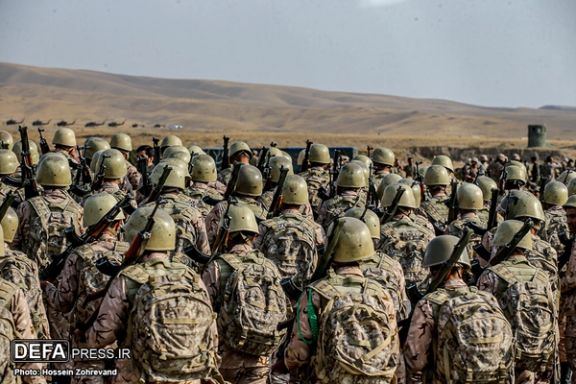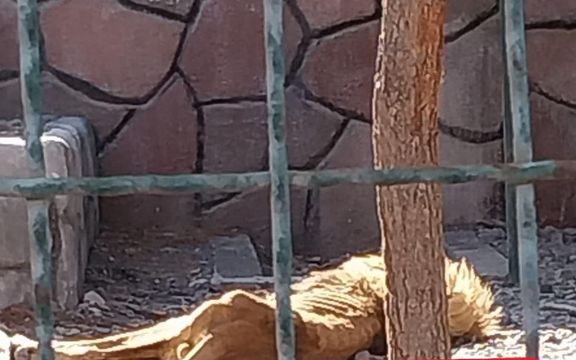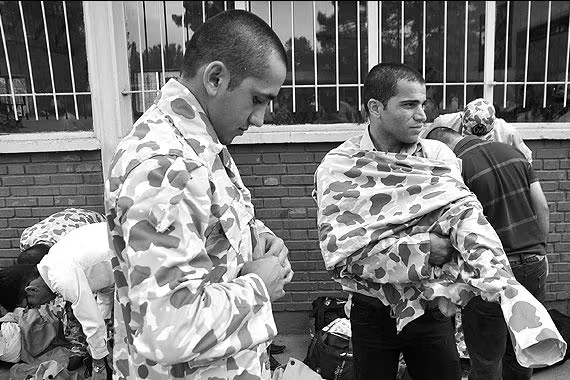Two Basij Militia Killed In Attack On Iran's Southeast Railway

Two Basij militia members were killed in an armed assault on a guard post along the railway route from Zahedan to Bam in southeast Iran.

Two Basij militia members were killed in an armed assault on a guard post along the railway route from Zahedan to Bam in southeast Iran.
According to the Quds Headquarters of the Ground Forces of the Islamic Revolutionary Guard Corps, the two members were identified as Mohammad Anvar Gomshadzahi and Abdolhossein Baluch.
The incident follows a deadly assault in December perpetrated by the militant Sunni organization Jaish al-Adl, which targeted a police station in Rask, a small city in Iran’s Sistan-Baluchistan Province, resulting in the deaths of 12 police officers.
Sistan-Baluchistan Province, marked by poverty and bordering Afghanistan and Pakistan, hosts a substantial Sunni population from the Baluch ethnic group. The community faces pressure from Iran’s Shiite clerical rulers and experiences frequent clashes between security forces and Sunni militants, as well as drug smugglers.
Jaish al-Adl, purportedly advocating for greater rights and improved living conditions for ethnic minority Baluchis, frequently asserts responsibility for such attacks. Over recent years, the group has launched multiple assaults on Iranian security forces in the province.
In July, Jaish al-Adl targeted a police station in Zahedan, the provincial capital, alleging its involvement in the September 30, 2022, massacre of approximately 90 civilians, known as Black Friday. The ensuing anti-government protests following Friday prayers led to confrontations with security forces, resulting in demonstrations in Zahedan and the subsequent arrest of hundreds by security forces.

Recent images on social media have shed light on the alarming condition of a lion housed in the Mashhad Zoo.
An image depicts the emaciated and weak state of the animal, prompting concerns about its welfare.
According to the Khorasan Online channel, the lion displayed no signs of movement, leaving observers unable to determine if it was still alive.
The incident is not an isolated case of animal welfare negligence in Iranian zoos. In May 2021, Safadasht Zoo in Karaj faced scrutiny after one of the three African zebras it acquired from the Netherlands died shortly after arrival. The zoo attributed the zebra's death to mismanagement during customs procedures, leading to stress and internal infection.
In 2018, 10 zebras perished during a transfer operation, and in 2011, 14 lions suffering from glanders were killed.
Experts argue that the root cause of such issues lies in the prioritization of economic interests over conservation efforts. The lack of specialized training and education for animal importers and zoo owners further exacerbates the problem.

Many Iranians marked the 45th anniversary of the 1979 Revolution Saturday night with cries of "Death to the Dictator" ringing through neighborhoods in the capital Tehran.
Video clips recorded on mobile phones show people chanting against the regime during official fireworks to commemorate 22 Bahman (11 February), the day the Pahlavi dynasty collapsed and gave way to what is now known as the Islamic Republic.
“The government celebrates, we mourn,” says Ramtin, a freshman at Tehran University who lives in east Tehran. “They know everybody hates the system. They know people are angry. And still they rub their celebration in our face –on TV, on billboards across the city, and now these fireworks. I’m not sure I would’ve chanted tonight if there were no fireworks.”
The gulf between the state and the majority of Iranians has never been wider. The society at large, and the younger generation, in particular, have ‘moved on’ from the Islamic Republic.
“The anniversary is as relevant to us as the Chinese new year, perhaps less,” says Saba, a 34-year old musician who’s turned to catering to earn a living. “No one cares, really. But when the thugs come to your neighborhood crying Allah-o Akbar, you fume and you cry your lungs out to shut them up.”
This seems to have been the pattern of protests Saturday night. There was no ‘call to action’, no online campaign even, to spur people to protest on the anniversary of the revolution. In most places, so far as it can be gathered from posts on social media, the protests have been spontaneous reactions to the regime’s propaganda.
“It is depressing, in a way,” Saba explains, “to stand by the window in your room and cry Death to the Islamic Republic. It does nothing to the Islamic Republic. We just show them we hate them. But even that they know already. Or you can say we remind ourselves that we’re still there. And we’re the many. Yeah, that’s the most important thing, I think.”
Ironically, the ‘home-chanting’ is a legacy of the 1979 Revolution. During martial law and at times of curfew, those who didn’t want to risk going out would chant against the Shah (Mohammad Reza Pahlavi) from their rooftops.
“They were mad,” Ramtin says jokingly. “My uncle was roughly my age in 1979. He was very active at university. After the revolution, he wasn’t allowed back in the university. He fled before I was born, during the war [with Iraq], first to Germany and then to the US. He’s living his best life now and people like me have to suffer the consequences of his madness after 45 years.”
The younger generation of Iranians see the Islamic Republic and its ideology as an obstacle to the life they want to live. Their opposition to the regime is more personal than political.
“When I cry Death to the Islamic Republic, it’s a political slogan. It’s an expression of rage,” Saba says, “but when my younger cousin says it, it’s a literal wish. And it sounds less desperate, as if she’s confident that it will happen.”
Saba lives with two roommates in a one-bed apartment in west Tehran. Her parents live in Ekbatan, a huge residential complex and a hotbed of activism during the 2022 protests.
“Ekbatan was really loud again tonight,” Saba says. “My mom called me and held her mobile outside the window so that I could hear the slogans. She’s too cautious, too afraid maybe, to protest, but she’s become extremely political since the Women Life Freedom movement, and because of all that she has witnessed in Ekbatan last year.”
Dozens were arrested in Ekbatan during the protests in 2022 after a Basiji militia was killed in the area. The case is still ongoing with at least four young men charged with murder.
“I know one of the Ekbatan boys,” Saba says, referring to those arrested more than a year ago. “I’m really worried that he or others may get long sentences or even be executed. Their innocence cannot save them, just as it didn’t those who’ve been hanged in the last year or so. It’s not for no good reason that we say Death to the Islamic Republic.

Two days after Iran’s judiciary accused online retailer Digikala of blasphemy, pro-government vigilantes wrote threatening messages on the walls of the company’s building in Tehran.
On Saturday, social media users in Iran shared images of the slogans written in red and black on the building’s walls. Messages such as “Blasphemy is our red line,” “It must be shut down,” and “We will go after every single employee” conveyed ominous threats.
Digikala has faced criticism for designing mugs, cups, and shoes with names and humorous short texts, some of which reference holy Shia figures like Fatemeh Zahra, the daughter of Islam’s prophet.
Iran’s judiciary denounced these designs as “sacrilegious” and declared that Digikala would face prosecution in Tehran’s general and revolutionary courts. No further details regarding the complaint have been disclosed.
Some users argue that many Iranians have religious names, suggesting that Digikala’s use of such names in its designs is not inherently sacrilegious or blasphemous.
This is not the first time the Islamic Republic’s judiciary has targeted Digikala, the largest online retailer. In February 2023, the company’s office building was attacked after photos surfaced showing female Digikala employees without hijab, prompting calls from hardliners to take action against the company and its staff.

Digikala employs tens of thousands of individuals, subcontractors, and businesses that supply its merchandise.
Independent news website Rouydad24 criticized the judiciary for penalizing businesses over hijab enforcement, questioning why online enterprises are being shuttered amid economic challenges.
Donya-ye Eqtesad newspaper echoed these concerns, highlighting the impact of online business closures on employees, contractors, and others in the industry, particularly when the economy is a pressing national issue.
In addition to Digikala, the Iranian regime has closed thousands of businesses in recent months for failing to comply with mandatory hijab regulations, resulting in significant job losses. Restaurants, cafes, bookstores, and hotels have faced closure or warnings due to staff and patrons violating hijab rules.
Since the death of Mahsa Amini in police custody in September 2022, sparking the Women, Life, Freedom protests, civil disobedience has grown increasingly challenging for the regime to suppress. Daily images of women without compulsory hijab continue to circulate online.
In response, Iranian authorities have implemented various measures, including sealing commercial venues, restricting services to women without hijab, issuing warnings, and employing car seizures and violent arrests.
In September, the Iranian parliament approved a bill titled “Protection of Family Through Promotion of Hijab and Chastity Culture,” outlining penalties, including hefty fines, for deviation from Islamic dress codes.
Armita Geravand, a sixteen-year-old girl, was one of the latest victimsof the regime’s repressive hijab policy. She died on October 28 after spending about a month in a coma due to brain damage sustained during a violent encounter with hijab enforcers at Tehran’s subway stations. Her funeral, held at Tehran’s Behesht-e Zahra cemetery, was heavily guarded.
According to HRANA’s annual report for 2023, 44 women were detained for women’s rights activism, with at least 20 activists sentenced to 182 months in prison, along with fines. Two individuals also received sentences of 222 lashes.

In the backdrop of expanding ties between Tehran and Moscow, a long-term agreement for the purchase of grains from Russia was announced on Saturday.
According to Iranian government media, the agreement, was inked during the visit of Iran's deputy minister of agriculture to Moscow. Under the terms of the agreement, leading Russian banks Sberbank and VTB will play pivotal roles by facilitating necessary credit lines.
The development follows a credit line worth 6.5 billion rubles (equivalent to over 71 million USD) announced in December for importing essential goods from Russia to Iran.
The deepening political, trade, and military ties between Russia and Iran have been closely watched, particularly by the United States, which views the relationship with growing concern. The alliance between Tehran and Moscow has strengthened, especially as Iran has supplied Russia with drones and missiles amid the ongoing conflict in Ukraine.
Analysts suggest that the Gaza war has provided Russia with a strategic advantage by diverting global attention away from its involvement in Ukraine while enabling alignment with nations expressing solidarity with the Palestinian cause.
In a recent announcement, the Russian foreign ministry highlighted an acceleration in efforts to finalize a "major new interstate agreement" with Iran. The scope of the agreement remains undisclosed, but it underscores the deepening ties across political, trade, and military domains.
Despite delays in renewing a two-decade-old strategic agreement with Iran, Russia's reliance on Iranian weapons, including kamikaze drones, amid its war in Ukraine, underscores the importance of the alliance for Moscow.
Much like North Korea, Iran remains a declared adversary of the United States and holds potential to furnish Moscow with military hardware crucial for its operations in Ukraine.

A conscript soldier turned into an assailant in a town near Tehran killing a law enforcement officer and a civilian before being killed in a police pursuit.
According to the Public Relations Office of the Alborz Province Police Command, the soldier, serving in the rescue unit, opened fire on a fellow unit member for reasons yet unknown, killing him. Subsequently, he proceeded to shoot and kill another civilian, hijacking his vehicle in the process.
IRNA reported that “law enforcement ordered the soldier to halt, but he ignored the commands, prompting officers to open fire. In the ensuing chaos, the soldier's vehicle overturned, leading to his death.”
The Alborz Police Command stated that the cause of the incident remains unclear and is currently under investigation.
The event follows a similar incident on February 1, when a soldier and an employee of the Pakdasht police station, east of Tehran were mistakenly killed in an “accidental shooting”.
The incident sheds light on the persistent issue of suicide and violence among soldiers in Iran, with numerous cases reported over the years. While exact statistics on soldier suicides are unavailable, media and social activists in Iran have raised concerns about the rising trend.
In a report two years ago, Shargh newspaper highlighted that besides actual suicides, around 15 percent of soldiers have suicidal thoughts, reflecting a troubling reality.
Compulsory military service in Iran, spanning nearly a century, adds to the complexity of the situation. An estimated three million soldiers are currently considered fugitives from service, with over 317,000 conscripts entering service last year alone.